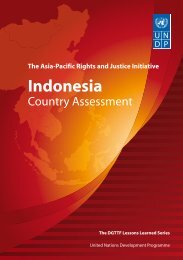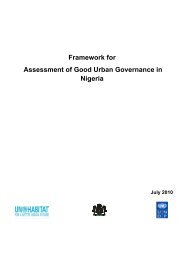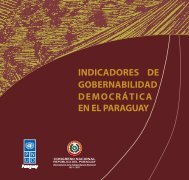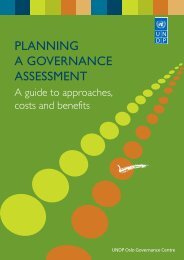A Users' Guide to Measuring Local Governance
A Users' Guide to Measuring Local Governance
A Users' Guide to Measuring Local Governance
You also want an ePaper? Increase the reach of your titles
YUMPU automatically turns print PDFs into web optimized ePapers that Google loves.
Europe. They have first been used in Latvia,<br />
Hungary, Poland and Romania, and subsequently<br />
in Bulgaria, Es<strong>to</strong>nia and Slovakia.<br />
Timeline<br />
Initiated in 2001. Follow-up data collection and<br />
expansion <strong>to</strong> more countries between 2002-03.<br />
Reports published in 2002 and 2006.<br />
Gender focus<br />
Not explicit. While the questionnaires do not<br />
include indica<strong>to</strong>rs relating <strong>to</strong> gender equality and<br />
representation, the country reports do seem <strong>to</strong><br />
address the issue of women’s participation in local<br />
politics and – <strong>to</strong> a minor extent – the issue of<br />
gender equality in civil society organisations.<br />
Poverty focus<br />
While governance indica<strong>to</strong>rs do not have an<br />
explicit pro-poor focus, the “explana<strong>to</strong>ry variables”<br />
for the local governance situation include a<br />
sub-section assessing some key characteristics of<br />
the municipality, including indica<strong>to</strong>rs of poverty<br />
and inequalities.<br />
Strengths<br />
The Indica<strong>to</strong>rs generate comparable information<br />
about the level of local democratic governance<br />
amongst municipalities facing a similar set of<br />
problems.<br />
Weaknesses<br />
• Willingness <strong>to</strong> participate in this evaluation by<br />
municipal administrative officials is a prerequisite<br />
<strong>to</strong> the successful use of the Indica<strong>to</strong>rs.<br />
• The assessment is only possible through the<br />
use of a specialised agency that can organise<br />
and manage the survey (the Tocqueville<br />
Research Center in this case).<br />
• The survey questions require sophisticated<br />
knowledge amongst the respondents, which<br />
may generate biased or skewed information.<br />
Where <strong>to</strong> find it<br />
The Indica<strong>to</strong>rs of <strong>Local</strong> Democratic <strong>Governance</strong> Project: Concepts and Hypothesis:<br />
http://lgi.osi.hu/publications/2001/22/IOLDG.PDF<br />
Contact details<br />
Gabor Soos<br />
Email: soos.gabor@t-rc.org<br />
Supplementary <strong>to</strong>ols/guidelines<br />
Indica<strong>to</strong>rs of <strong>Local</strong> Democratic <strong>Governance</strong>, <strong>Local</strong> Government and Public Service Reform Initiative, OSI:<br />
http://lgi.osi.hu/documents.php?id=15&m_id=&bid=1<br />
“The State of <strong>Local</strong> Democracy in Central Europe”, 2002, introduction:<br />
http://lgi.osi.hu/publications/2002/100/Soos-Introduction.pdf<br />
“The State of <strong>Local</strong> Democracy in Central Europe”, 2002, questionnaires:<br />
http://lgi.osi.hu/publications/2002/100/Soos-Appendices.pdf<br />
“The State of <strong>Local</strong> Democracy in Central Europe”, 2006:<br />
http://lgi.osi.hu/publications/2006/340/Soos_complete_low_res_2.pdf<br />
A Users’ <strong>Guide</strong> <strong>to</strong> <strong>Measuring</strong> <strong>Local</strong> <strong>Governance</strong> 77




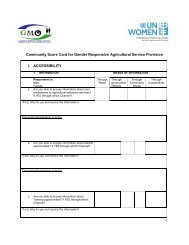

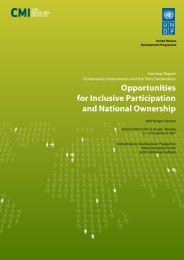
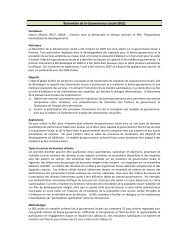
![GuÃa del Usuario ] - Governance Assessment Portal](https://img.yumpu.com/44740603/1/190x253/gua-a-del-usuario-governance-assessment-portal.jpg?quality=85)
